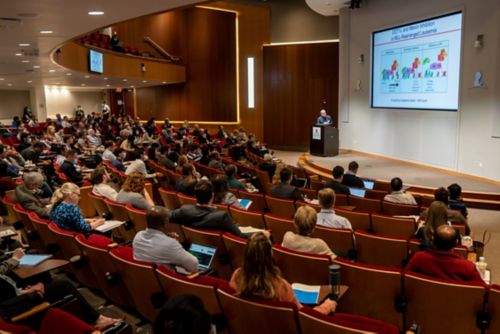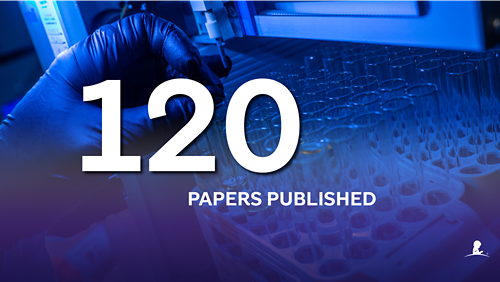St. Jude Family of Websites
Explore our cutting edge research, world-class patient care, career opportunities and more.
St. Jude Children's Research Hospital Home

- Fundraising
St. Jude Family of Websites
Explore our cutting edge research, world-class patient care, career opportunities and more.
St. Jude Children's Research Hospital Home

- Fundraising
About the collaborative
The Chromatin Collaborative was launched in 2017 to identify distinct pediatric cancers’ developmental and mechanistic origins. For many cancers diagnosed early in life, there is a disruption of normal developmental pathways and processes via mutational genetic events and driver gene alterations. While we know chromatin-assisted complexes — those responsible for packaging and regulating DNA — control developmental gene expression (epigenetics), we need a greater understanding of how disruptions to these complexes drive pediatric cancer development and progression.
To advance this understanding, the first phase of the collaborative’s combined expertise in pediatric cancer genomics, tumor biology, epigenetics, chromatin, gene regulation and proteomics to examine chromatin deregulation.

The collective launched key projects investigating aberrant histone modification states, novel enhancer hijacking events and defective chromatin complexes in difficult-to-treat rhabdoid tumors, medulloblastoma and acute leukemia.
Key discoveries in the first phase produced an unprecedented atlas of the medulloblastoma chromatin landscape; identified new lesions and subtypes of leukemias; and identified novel genetic, small molecule and drug vulnerabilities in rhabdoid tumors.
Building upon the successes of the first phase, the second phase, renewed in 2022, will continue to study developmental and mechanistic drivers of pediatric cancer through the lens of chromatin regulation.

Across pediatric cancers, a predominant theme is how the mutational landscape changes or removes machinery that guides transcription and epigenetics. For instance, a loss of the SWI/SNF chromatin remodeling complex subunit SMARCB1 drives rhabdoid tumors, while the recurrent targeting of components of the MLL/UTX histone-modifying complex is present in medulloblastomas. Meanwhile, fusion oncoproteins — made of a transcription factor or chromatin modifier — drive acute leukemias. Yet, because we lack an in-depth understanding of pediatric cancer’s developmental origins and mechanisms, the epigenetic and transcriptional determinants that drive oncogenic effects in pre-cancerous cells remain unclear.
If we can understand the intersection between development and mutational events that target the epigenome/transcriptome, we may be able to address this fundamental question. The collaborative will continue to utilize expertise in genomics, biology, biochemistry and proteomics, but will expand to include innovative functional genomics, single-cell multi-omics, computational biology and state-of-the-art proteomics.

The collaborative will drive eight research projects across technical cores — quantitative proteomics, technology, and computational — that seek to provide new insights into molecular determinants, oncogenic transcription factor activity, cells of origin and chromatin landscapes in the context of medulloblastomas, rhabdoid tumors and leukemias.
We seek to create impactful discoveries related to the epigenetic drivers of oncogenesis, generate more accurate disease models and create more effective preclinical studies. We aim for these fundamental advances to improve treatment opportunities and quality of life for children with difficult-to-treat cancers.

Collaborative members
Lead — Paul A. Northcott, PhD, St. Jude Children’s Research Hospital
Charles Mullighan, PhD, St. Jude Children’s Research Hospital
Charles Roberts, MD, PhD, St. Jude Children’s Research Hospital
Scott A. Armstrong, MD, PhD, Dana Farber Cancer Institute
Bradley E. Bernstein, MD, PhD, Dana Farber Cancer Institute
Volker Hovestadt, PhD, Dana Farber Cancer Institute/HMS, Broad Institute
Benjamin A. Garcia, PhD, Washington University School of Medicine